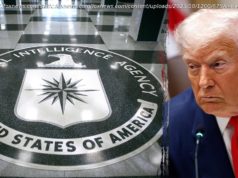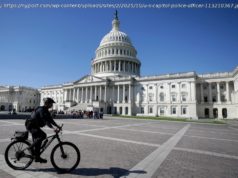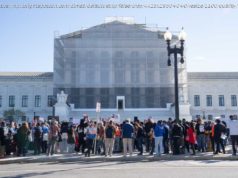President Trump tried to deflect questions Thursday about his son’s meeting last year with a Russian lawyer, implying that the attorney…
Here’s our look at the Trump administration and the rest of Washington:
President Trump tried to deflect questions Thursday about his son’s meeting last year with a Russian lawyer, implying that the attorney had been let into the U. S. under murky circumstances by the Obama administration’s attorney general.
Trump, employing an attribution that he often uses, „somebody said, “ remarked that he had heard the lawyer, Natalia Veselnitskaya, had been allowed into the U. S. by then-Atty. Gen. Loretta Lynch, a frequent target of Trump aides and supporters.
“Somebody said that her visa or her passport, to come into the country, was approved by Attorney General Lynch, ” Trump said at a news conference in Paris.
“Now, maybe that’s wrong. I just heard that a little while ago, but a little surprised to hear that. So, she was here because of Lynch.”
There is no evidence that Lynch was involved in the decision to admit Veselnitskaya, and Trump provided none.
Robert Raben, a spokesman for Lynch, denied that she was involved in admitting Veselnitskaya.
„Atty. Gen. Lynch, as the former head of the Justice Department, does not have any personal knowledge of Ms. Veselnitskaya’s travel, ” Raben said.
“The State Department issues visas, and the Department of Homeland Security oversees entry to the United States at airports.”
At the Homeland Security Department, officials said that the Russian lawyer had been admitted to the country to handle a court case.
“Because she was coming here for a court case, there was a specific reason behind it, ” spokesman Dave Lapan said.
Getting into the U. S. appears to have been extremely difficult for Veselnitskaya, however.
Before meeting Donald Trump Jr., Veselnitskaya had been traveling to the U. S. while defending a Russian firm against civil charges of money laundering and fraud filed by Justice Department lawyers in New York.
Prosecutors from the U. S. attorney’s office in the Manhattan repeatedly impeded her entry, according to a person close to Veselnitskaya. In 2015, she publicly complained that the U. S. government had denied her a visa.
To attend court proceedings in the case, she was granted “parole, ” a short-term entry authorization for noncitizens, after she was turned down for a regular visa.
It’s not known why she was turned down.
When she met with Trump Jr. at Trump Tower last June, she was in the U. S. on parole in connection with the case, the person close to Veselnitskaya said.
The State Department issues visas, but the three main subunits of the Department of Homeland Security – Citizenship and Immigration Services, Immigration and Customs Enforcement, and Customs and Border Protection –can grant parole allowing people to be in the country without a visa.
Such paroles are granted for short periods for humanitarian or public-interest reasons. Travelers who receive parole are given a written authorization to enter the U. S., usually for short periods of time.
Sen. Charles E. Grassley (R-Iowa) , chairman of the Judiciary Committee, sent a letter to DHS and the State Department on Wednesday asking for information about the decision to admit Veselnitskaya to the U. S.
In 2015 and 2016, before the Trump meeting, Veselnitskaya claimed in court papers that the U. S. government had harassed her and tried to prevent her from being present to defend her clients
In November 2015, she said she was detained for two hours at Heathrow Airport in Britain on her way to the U. S. Officials “specifically targeted me on the basis of the parole numbers that the United States government had assigned to me, ” she said.
She added that she was “unjustifiably subjected to a strip search, for no apparent reason.”
In January, 2016, her request to have her parole extended was denied, she claimed in the court filing, prompting her to appeal to the judge in the case to intervene.
“If I am forced to leave New York, the defense of this lawsuit will suffer, ” she said.
Her parole was eventually extended, and the harassment diminished, the person close to Veselnitskaya said.
In a subpoena from September, prosecutors from the Southern District of New York summoned another figure in the alleged scheme, Andrei Pavlov, to testify before a grand jury in New York. According to the subpoena, which was attached to a court filing, prosecutors wanted Pavlov to bring documents and copies of his correspondence with six people – including Veselnitskaya.
The United States attorney supervising that investigation, Preet Bharara, was fired by Trump in January after what the lawyer said were a series of “uncomfortable” calls in which Trump seemed to be trying to compromise his independence.






